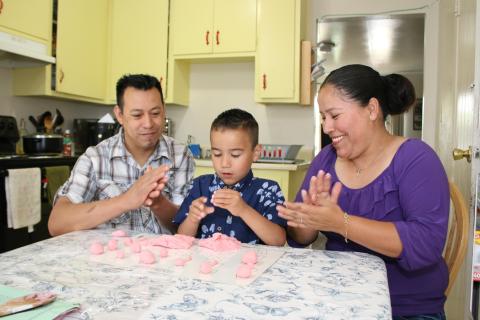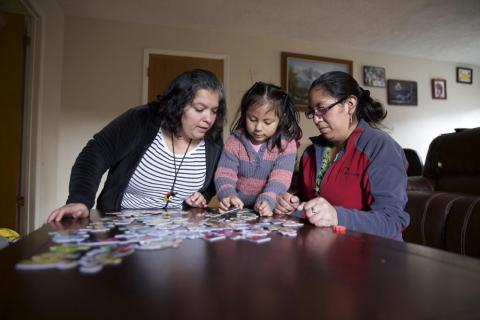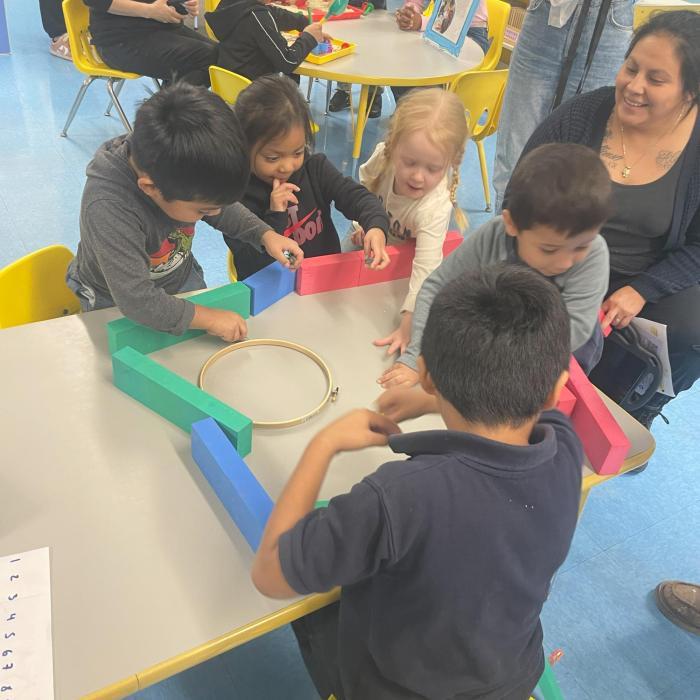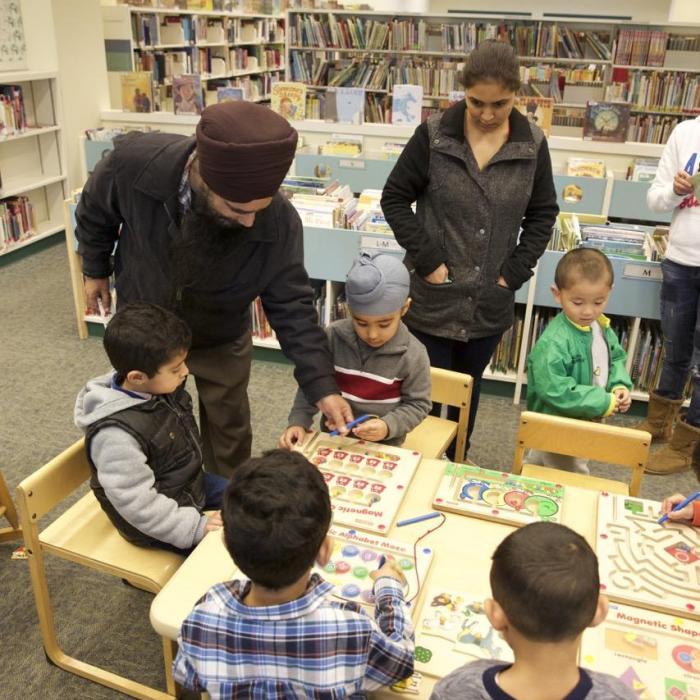Recursos del facilitador
Desarrollar la capacidad de los educadores
Serie de recursos sobre un conjunto de temas iniciales de STEAM para que los facilitadores y entrenadores los utilicen en el aprendizaje profesional con educadores.
CPE ofrece un enfoque basado en las fortalezas para la participación de la familia en STEAM. Un enfoque basado en las fortalezas reconoce y se basa en las formas en que las familias ya apoyan el bienestar, el desarrollo y el aprendizaje de los niños. Exploremos la participación de la familia en STEAM a través de los principios del CPE:

Observe este video de CPE "¡Estoy listo!" que muestra cómo todos desde la infancia hasta los adultos pueden explorar STEAM.
Reflexionar:
¿Cómo podrían los principios del CPE aumentar su conocimiento de las prácticas existentes de STEAM de las familias? ¿Cómo podrían los principios ayudar a enfocar los esfuerzos de participación de la familia STEAM de su agencia?
Las actitudes hacia las matemáticas y ciencias son una combinación de:
Las familias desempeñan el papel más importante en la promoción del aprendizaje temprano de matemáticas y ciencias para los niños. La forma en que las familias se sienten y piensan acerca de las matemáticas y la ciencia, sus actitudes respecto a las matemáticas y ciencias, tienen impacto sobre:
Explore el recurso Involucrar a las familias en matemáticas tempranas para aprender más acerca de las creencias y sentimientos de las familias sobre matemáticas, actividades matemáticas en el hogar y formas en que los educadores pueden apoyar la participación de la familia en matemáticas.
Los niños y adultos tienen muchas oportunidades de participar en matemáticas y ciencias en hogares, comunidades o entornos de aprendizaje temprano. Hogar se refiere a cualquier entorno en el que las familias cuidan de sus hijos. Los entornos de aprendizaje temprano son entornos en los que los educadores enseñan y cuidan a los niños.
Las familias pueden participar en el aprendizaje de STEAM en la comunidad más amplia, como parques, campos deportivos, museos, colegios, eventos culturales, tiendas de comestibles o centros de vida silvestre. En el video anterior del CPE "Estoy listo!", usted observó a bebés explorando conceptos matemáticos en el autobús.
Explorar espacios comunitarios como sitios para experiencias de participación familiar en STEAM. Conectar con los socios de la comunidad que reflejan la diversidad de las familias, comunidades y entornos de aprendizaje temprano que su agencia sirve.

Observe este video de CPE "¡Estoy listo!" de una familia que explora las matemáticas durante una experiencia diaria-juego en el parque.
Reflexionar:
El juego ofrece muchas oportunidades para desarrollar y utilizar las habilidades de pensamiento en matemáticas y ciencias. A medida que las personas juegan, hacen descubrimientos, resuelven problemas y colaboran.
El aprendizaje lúdico puede profundizar la comprensión de los conceptos de STEAM por parte de los niños. Las familias pueden participar en eventos lúdicos de STEAM en su comunidad. Por ejemplo, las familias pueden unirse a la hora de cuentos de STEAM de una biblioteca, visitar una exposición comunitaria de arte o asistir a una feria del condado para observar un concurso gigante de calabazas.
Ampliar las formas en que las familias exploran STEAM con alegría.
El aprendizaje impactante de STEAM se conecta con las experiencias vividas, los intereses y las preguntas de los niños. Las experiencias de aprendizaje pueden inspirarse en el conocimiento de las artes por parte de las familias, como la fabricación de máscaras o los espectáculos de danza.

Dado un acceso equitativo a las oportunidades, todos los niños y adultos - de cualquier origen, raza, cultura, etnia, idioma, género, capacidad o condición socioeconómica - pueden aprender matemáticas y ciencias.

Las experiencias de aprendizaje de STEAM aumentan el sentido de pertenencia para diversos grupos, como niñas, niños de color, niños con discapacidades y niños que viven en comunidades de bajos ingresos. Hacer STEAM accesible a todos los niños y adultos ofreciendo:
Exploremos algunas maneras en que las experiencias de STEAM pueden ser receptivas a las familias en su contexto comunitario.
Módulos para líderes, facilitadores profesionales de aprendizaje y entrenadores para desarrollar sus conocimientos y habilidades en la forma de proporcionar un aprendizaje profesional temprano en STEAM.
Serie de recursos sobre un conjunto de temas iniciales de STEAM para que los facilitadores y entrenadores los utilicen en el aprendizaje profesional con educadores.
Copie el enlace para compartir este recurso con estudiantes, familias, y colegas. O guarde el enlace por si quiere volver a consultarlo más tarde.